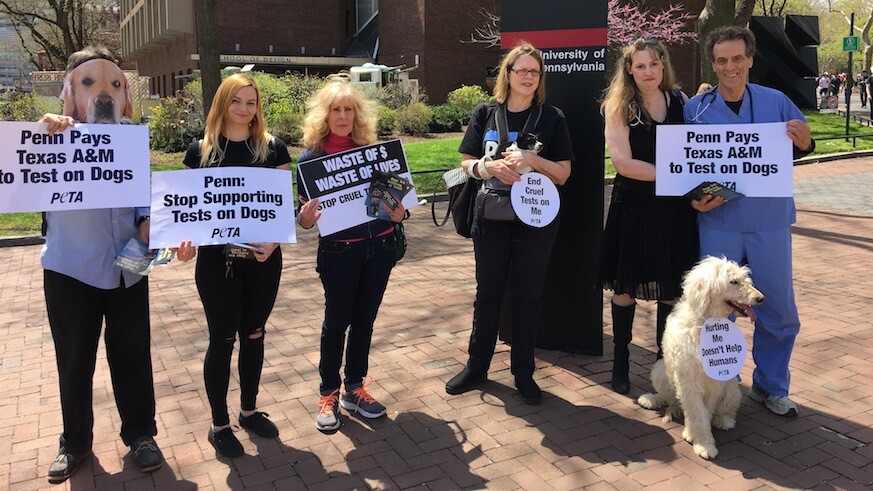People for the Ethical Treatment of Animals (PETA) is orchestrating various protests around the country for World Week for Animals in Laboratories. In Philly, protesters wearing golden retriever masks and with labradoodle and fox terrier mascots in tow protested at UPenn against what they said is the university’s funding for experiments at Texas A&M University (TAMU) involving breeding golden retrievers with muscular dystrophy to study the rare disease.
Marianne Bessey, a PETA campaign manager, said there are some 90 dogs at TAMU that have been bred with muscular dystrophy for researchers to study, and said they want UPenn to stop funding the research, which she described as “cruel and useless.” (UPenn did not respond to requests to confirm if they are financially linked with TAMU’s research.)
“It’s been 37 years of cruel and useless experiments on dogs that haven’t led to any sort of progress in curing or treating this disease,” Bessey said. “It’s not helping humans and it’s not helping animals. … Stop these experiments, and put the funds toward actually human-relevant experiments that will actually solve problems.”
Bessey said that the research constitutes cruelty in that dogs with this type of dystrophy are bred to be studied, and claimed the “crippingly and painful disease” causes the dogs in the experiment to live “struggling to walk, swallow and even breathe.”
TAMU has been criticized by PETA for years over these experiments, and the lives of dogs documented in video posted online by PETA. TAMU said the dogs have Duchenne muscular dystrophy (DMD), an incurable disease.
“Any parent with an affected child is acutely aware of how devastating this disease is, not only to the affected children but also to their families,” TAMU said in a statement. “The dogs with DMD at Texas A&M are treated with great care and tenderness, as they help unravel the mysteries and potential cures for this dreadful disease. Not only do our people who work with these dogs truly care about them as individuals, the work being conducted is highly regulated.”
Bessey claimed the research had accomplished nothing in more than three decades.
“This wasteful and cruel experimentation on dogs is bad science, it’s cruel, and it’s a stain on the university’s reputation,” she said.
UPenn did not respond to requests for comment on its ties to TAMU, but defended its own practices, saying all their animal research is regulated and overseen by a team of 13 veterinary technicians. “The University of Pennsylvania is committed to maintaining the highest standard of humane care for animals used in biomedical research, which is aimed at finding treatments and cures for some of the most vexing diseases of our time, in both humans and animals,” a spokesman said via email.
To learn more, visit PETA.org.



























